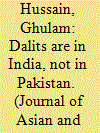|
|
|
Sort Order |
|
|
|
Items / Page
|
|
|
|
|
|
|
| Srl | Item |
| 1 |
ID:
170539


|
|
|
|
|
| Summary/Abstract |
This paper is an attempt to investigate the discursive bases of the categorical and identity-based choices available to the Dalits under the Ashrafia hegemony, and the resultant denial of Dalitness prevalent among the Dalits and the Sindhi civil society in, Pakistan. Informed by the Ambedkarian (subaltern) perspective, I analyse the conversational interviews conducted with the Dalit activists (mostly Scheduled Castes), and with their Ashrafia class counterparts. Interrogating the superior status of Sayed caste(s), I contend that the the denial of casteism, the opposition to the use of the ‘Dalit’ identity marker and the negation of the Dalitness seemed to have as much to do with the belief in Ashrafia values as it had with the normative sanction of the Savarna. values.Both the Savarna and the Ashrafia values seemed to seek legitimacy from the dominant ethnocentric forms of the politicized Sufism. Political Sufism merges the Savarna and Ashrafia norms by means of the syncretic narrative based on interfaith harmony and the civilisational rhetoric. Ashrafisation (also Savarnisation) and the reverence towards Sayeds were the key self-perpetuating hegemonic processes underlying the attempts by the Dalits and the civil society activists to dissipate cognitive dissonance underlying the existing Dalitness and the Ashrafia hegemony. I, therefore, conclude that the practices and the narratives prevalent in Sindhi civil society undermined the Dalit agency to come up with their own counter-hegemonic and emancipatory narrative(s).
|
|
|
|
|
|
|
|
|
|
|
|
|
|
|
|
| 2 |
ID:
167395


|
|
|
|
|
| Summary/Abstract |
This paper is an attempt to investigate the historical trajectory of Ashrafia hegemony in Sindh, the province of Pakistan. I begin with the analysis of biopolitics of caste, class and religion organised around Hindu–Muslim binarism and unity as it unfolded during and after the partition of the Indian subcontinent. I particularly analyse the demographic shifts, the official categorisation of populations, and the communal and ethnonationalist claims that led to the specific kind of interpretation of religion, caste and class. Informed by the Ambedkarian subaltern perspective and based on the analysis of ethnographic data and vernacular literature, I explain that nationalist ideologies framed in the narratives of political Islam and Sufism tend to organise politics around Hindu–Muslim otherness, as in case of Pakistani nationalism, and Hindu–Muslim harmony, as in case of Sindhi nationalism. Based on that understanding, I argue that Ashrafia advantage, by and large, is the product of pre-existing historical hegemonic relations than any conscious strategy, and or directly imposed domination. Since both the Ashrafia narratives primarily imagine people through religious binaries, they lack the counter-hegemonic elements that could confront casteism that lies at the intersection of class and religion. None of the narratives, being performative projections of the ideal religious society, brought casteism in their focus while dealing with the structural inequalities, social hierarchies and the issues of political representation of the Dalit class. It resulted in the unwarranted legitimacy for Ashrafia hegemony, Jati Hindu domination and Dalit subordination. This re-hierarchised caste groups and continue to (re)distribute the caste capital by (re)producing Sayedism, Dalit exclusion and caste-class oligarchies.
|
|
|
|
|
|
|
|
|
|
|
|
|
|
|
|
|
|
|
|
|